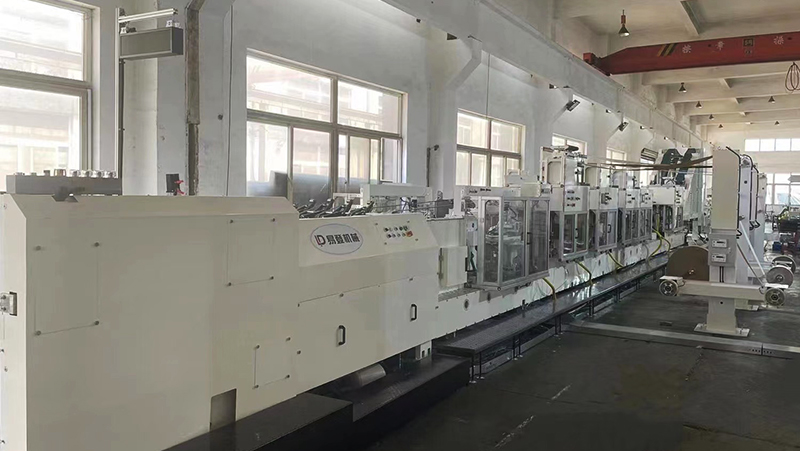Streamlining Sustainable Packaging with Modular Paper Bag Production Line Technology
Release time:2025-05-14 Classification:Knowledge
The global shift toward eco-friendly packaging solutions has accelerated demand for efficient, scalable manufacturing systems. Among these innovations, modular paper bag production lines have emerged as a cornerstone of modern packaging operations. Combining adaptability, precision, and sustainability, these systems redefine how paper-based packaging is designed, produced, and delivered to meet evolving market needs.
Understanding Modular Paper Bag Production Lines
A modular paper bag production line refers to an integrated manufacturing system composed of interchangeable, purpose-built modules. Each module performs a specific function—such as paper feeding, printing, cutting, folding, gluing, or handle attachment—while operating cohesively within a unified framework. This design allows manufacturers to customize workflows, scale production capacity, and adapt to diverse product specifications without overhauling entire systems.

Key Advantages of Modular Systems
- Flexibility in Production
Modular configurations enable rapid reconfiguration for different bag types, sizes, or designs. For instance, switching from producing flat-bottom grocery bags to twisted-handle retail bags requires only adjustments to specific modules, minimizing downtime. This agility is critical in industries requiring short runs or frequent design updates. - Enhanced Efficiency and Scalability
By compartmentalizing processes, modular systems optimize resource allocation. Operators can add or remove modules to match production targets, ensuring cost-effectiveness for both small-scale and high-volume orders. Automated quality control modules further reduce waste by detecting defects in real time. - Sustainability Integration
Modular paper bag production lines inherently support circular economy principles. Precision cutting modules minimize material waste, while energy-efficient components lower overall carbon footprints. Additionally, compatibility with recycled or biodegradable paper substrates aligns with global sustainability mandates. - Reduced Maintenance Costs
Isolated module design simplifies troubleshooting and repairs. If one component malfunctions, it can be serviced independently without halting the entire production line. Predictive maintenance technologies, such as IoT-enabled sensors, further enhance operational reliability.
Core Components of a Modular Production Line
- Paper Unwinding and Feeding Module: Ensures continuous, tension-controlled paper supply.
- Printing Module: Supports high-resolution flexographic or digital printing for branding or regulatory labeling.
- Die-Cutting and Creasing Module: Precisely shapes bags and adds fold lines for consistent assembly.
- Gluing and Forming Module: Secures seams and constructs bag bodies using food-grade adhesives.
- Handle Attachment Module: Automates the integration of flat, twisted, or ribbon-style handles.
- Quality Inspection Module: Employs vision systems to verify dimensions, print accuracy, and structural integrity.
Applications Across Industries
Modular paper bag production lines cater to a broad spectrum of sectors:
- Retail: Custom-printed shopping bags with reinforced handles.
- Food Service: Grease-resistant and compostable takeaway bags.
- E-Commerce: Durable, lightweight shipping bags with tamper-evident seals.
- Industrial: Heavy-duty sacks for agricultural or construction materials.
Future Trends and Innovations
Advancements in automation and material science are poised to elevate modular systems further. Emerging trends include:
- AI-Driven Optimization: Machine learning algorithms to predict demand and adjust production parameters dynamically.
- Hybrid Material Compatibility: Modules adaptable to paper composites blended with plant-based polymers for enhanced durability.
- Energy Recovery Systems: Integration of heat recapture technologies to reduce energy consumption.
Modular paper bag production lines represent a paradigm shift in packaging manufacturing, balancing operational efficiency with environmental responsibility. Their customizable architecture not only future-proofs production facilities but also empowers brands to respond swiftly to regulatory changes and consumer preferences. As industries continue to prioritize sustainability, investing in modular systems will remain a strategic imperative for businesses aiming to lead in the circular economy era.
By embracing modularity, manufacturers can achieve unparalleled versatility, reduce lifecycle costs, and contribute meaningfully to a waste-conscious global market—all while delivering high-quality paper packaging solutions that meet the demands of tomorrow.






